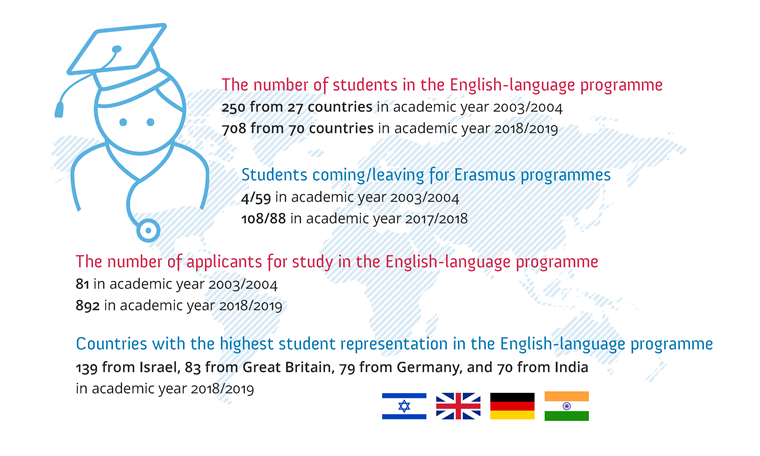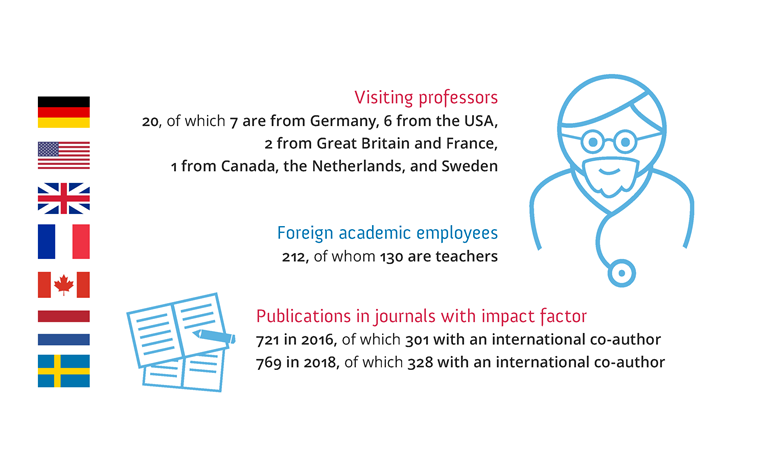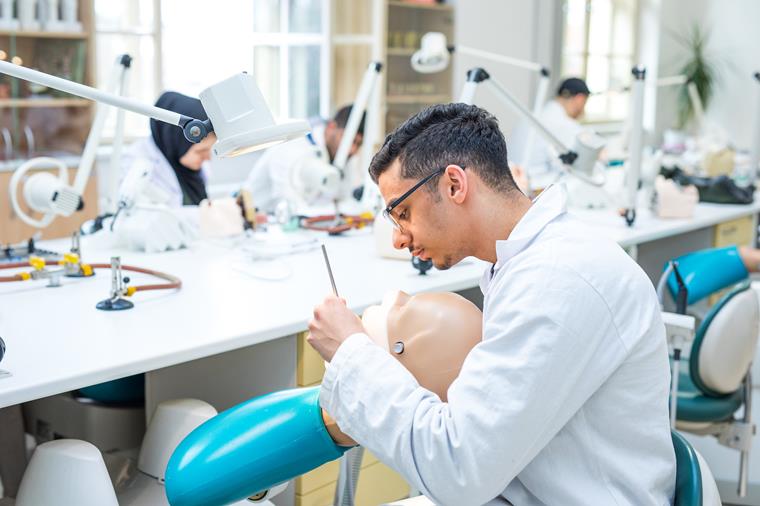Jednička in the World
Our faculty is one of the oldest medical schools of university type in the world. Its history features numerous names of great scientists who importantly contributed to the development of medicine. In our day and age, however, one cannot base school’s prestige and status just on its history and tradition. One of the key elements of success nowadays are international relations. The 1st Faculty of Medicine of the Charles University is fully aware of this and builds its international relations on the basic principles of openness, collaboration, and international prestige. Exchanges of students and teachers, and especially international collaboration in scientific activities enrich life at the faculty and bring new inspirations and impulses.
After a long period of relative international isolation of Czech universities, isolation especially with respect to Western countries, the opening of courses of general medicine and dentistry taught in English became a symbol of newfound openness of the 1st Faculty of Medicine of the Charles University to the world after 1989. Alongside the economic contribution these courses, i.e. resources which helped improve the personnel situation and technical facilities of the faculty, this step was also the expression of several very important aims:
* emphasis on the open character of the faculty;
* interest in joining international programmes of student exchange;
* establishment and development of contacts among students from different countries, whereby it was hoped these contacts would develop into professional collaborations;
* formation of a group of physicians familiar with our environment who could in future develop collaboration between their institutions and the 1st Faculty of Medicine both in terms of research and in terms of cooperation in teaching.

Interest of international students had grown tenfold
Over the past fifteen years, that is, since immediately before the Czech Republic had joined the EU, the number of students in the English parallel programme grew from 250 in academic year 2003/2004 to 708 in academic year 2018/2019, whereby the number of countries they come from increased from 27 to 70. It is, however, especially the growing interest in the study of general medicine or dentistry that attests to our faculty’s good international reputation. While in 2003/2004, only 70 applicants took the entrance exams to the English parallel programme, fifteen years later, the number grew to 892. Good reputation of our graduates, often reported by our international colleagues, importantly contributes to this growing interest and it also improves the chances of Czech graduates who apply for positions abroad. From the perspective of our faculty’s prestige, it is highly desirable and a cause for celebration, but on the other hand, this is one of the factors which contribute to the shortage of physicians in the Czech Republic.
The number of Erasmus exchanges is growing
In recent years, our faculty focused on improving the quality of international relations and on deepening the already contractually established collaborations. Our faculty also actively supports the exchange of both undergraduate and postgraduate students, as well as the mobility of teachers and other academics. Of all the medical faculties of the Charles University, the 1st Faculty of Medicine offers to students and academics the broadest range of internships or stays abroad, whereby of key significance remains the Erasmus+ programme (2014–2020), which since 2014 unites some earlier exchange programmes, namely Comenius, Erasmus, Erasmus Mundus, Leonardo da Vinci, and Grundvig. It is split in three main divisions: Education Mobility (KA 1), Strategic Partnerships (KA 2), and Support of Education Policy Reforms (KA 3). The minimum length of study abroad within the programme is three months, for practical internships it is two months. Students of long masters’ programmes can stay abroad for study repeatedly, up to 24 months in total. Since 2015, Erasmus+ moreover includes a new feature, namely International Credit Mobility, which facilitates the individual mobility of students and staff to countries outside Europe. Thanks to this new feature, we can thus offer mutual exchanges of students and staff, study stays for postgraduate students ranging in length from three to twelve months, and residential stays for academic workers or postdocs ranging from five days to two months.
In 2018, a total of 81 of our students studied for some time abroad, whereas fifteen years ago, it was 76. The 1st Faculty of Medicine of the Charles University also remains very popular with incoming students: this year, we had 113 visitors, whereby 15 years ago, it was just 36. The most popular destinations where our students wish to go are traditionally Germany, Italy, and France. Most foreign students come from these three countries and from Portugal and Spain. In the last academic year, nine employees of our faculty travelled abroad to further their expertise, which is nine more than fifteen years ago.

With IFMSA to Mexico, Kenya, or Sri Lanka
Another important initiative which aids the development of international contacts and mobility of our students is the IFMSA, an international non-governmental organisation which organises various kinds of student exchanges. A total of 67 international students were able to avail themselves of IFMSA one-month stays in European countries and 73 students from our faculty went to IFMSA internships both to European and overseas countries. Most popular among the overseas destinations were Mexico, Indonesia, Sri Lanka, and Kenya. Student exchanges between Swiss universities and universities in EU countries continue to be supported by the Swiss–European Mobility Programme, which in 2014 replaced the relevant section of the Erasmus. Last year, our faculty sent 3 students to Switzerland.
In 2018, a total of 25 of our students went abroad independently, i.e. outside the exchange programmes, whereby up to half of the cost of their stay was covered from the sources of the Mobility Fund. These initiatives unfortunately still struggle with the legislative problem of recognition of student status outside the framework of European exchange programmes, which leads to problems especially in terms of contact with patients. The 1st Faculty of Medicine had therefore prepared agreements which help students travel abroad for theoretical education and provide them with at least limited legal and liability protection.
Especially our foreign students tend to use the opportunity of doing at least part of their clinical internship abroad, in Germany, Israel, or the USA, in three hospitals with which our faculty had signed the requisite agreements. The main goal of this initiative is to help our students become better acquainted with healthcare systems in their native countries, but depending on programme capacity and language skills, the initiative is also opened to other students.
Prestigious partners from all over the world
For a number of years, the 1st Faculty of Medicine of the Charles University has also been maintaining high-quality and extensive collaboration in science, research, and education. Partnership with prestigious international universities brings new and valuable experiences and knowledge. Our partners are universities, scientific institutes, and clinical departments not only in Europe but also in the USA and other non-European countries. In 2018, our faculty engaged in 19 such agreement-based collaborations: ten with European institutions, six with Asian ones, and three with US or Canadian ones. In addition to that, dozens of other, mainly short- or medium-term mostly research collaboration projects take place, which are not based on the adoption of official agreements but do lead to significant joint publications.
The 1st Faculty of Medicine is also highly active in the key international collaboration programmes of the Charles University, such as Alliance 4EU and Strategic Partnerships of the Charles University. Their goal is to respond to global trends and to improve the competitive potential of the university.
On the level of teaching and research, collaboration mostly takes the form of bilateral educational – both undergraduate and postgraduate – activities, seminars, and congresses. This facilitates a systematic integration of current international experiences and knowledge in teaching and science at our faculty. Many international speakers took part in the symposia and conferences organised by the various institutes or specialised medical associations in collaboration with our faculty. Presentations delivered by international researchers at these occasions importantly contribute to the work of mainly our graduate students and their supervisors.

We have international teachers and visiting professors
The abovementioned activities are also aided by a relatively new programme of the Czech Ministry of Education whose aim is to support international cooperation. The financial resources of this programme are intended mainly to support the international stays of our students and staff, students arriving from abroad who come within the framework of International Credit Mobility, and our visiting professors. Thanks to this programme, the 1st Faculty of Medicine was in the past year able to implement 14 projects, aimed mainly at support of incoming and outcoming mobility of academic staff. Results are seen mainly in strengthened collaboration with a number of prestigious international institutions and in short-term visits of internationally respected academics. In this connection, it ought to be mentioned that at the moment, our faculty has 212 academics from abroad, 130 of whom also teach students. Aside from that, the 1st Faculty of Medicine hosts 20 visiting professors from seven countries, most of whom come from Germany and the United States.
Faculty management is determined to continue in further intensive development of international collaboration. We want to focus especially on support of short-term stays in as part of student mobility, on rational use of resources earmarked for support of academic mobility, on projects that would enable us to employ more international academic workers, and, as much as possible, on support of international research projects.
Otomar Kittnar, member of the Dean’s College
